Futures
I've been thinking about futures.
Painted blue columns and dusted cakes. Hot lunch in one hand, a bottomless cup of coffee in the other. Orders interrupted by the abrupt screech of a chair leg. And above my head, shifting against the ceiling tile, weightless yet heavy in the air, human voices calling out like lights flashing in the dark.
I didn’t clue in until writing this One Word that the name on the sign read Future Bistro. For over 15 years I’ve called the cafe at the corner of Bloor and Brunswick Futures. Where did the name alteration come from? I asked friends, coworkers, and the cashier at the bistro. Sure enough, everyone says Futures. But no one knows why. Maybe it’s too awkward to text a friend, “We’re going to Future, want to join us?”
Either way, the cafe represented, at one point in my history, the speakeasy at the edge of the world.
In the late 2000s, between classes at the University of Toronto, I’d explore the furthest reaches of campus. I’d walk as far as College and Spadina or Bloor and Bay, stare at the nests of streetcar cables and unfriendly faces, then turn around, unsure of where the road would take me. I’d always find myself back at Futures. Every time I stepped inside, I was starving.
I’m not talking about the breakfast special — runny eggs benny, toast, home fries, slice of melon, coffee — but the stories I’d read and the ideas I’d hear. Arguments with classmates about Socrates or Locke. Sitting on the patio and searching for answers in a Victorian novel. I knew when I found what I was looking for because I’d feel it welling up in my stomach, warm and arresting. The best discoveries hit me from nowhere and brought me to tears.
This was before I owned a smartphone. Before Instagram. Before I lost my hair. Before I met my wife. I would spend my walks from campus to Futures searching the store windows and overhearing conversations for a phrase that could make sense of the darkness that always seemed an arms-length away.
Futures also changed how I saw Toronto. Two years before I stepped into the cafe for the first time, I became familiar with a windy stretch of University Avenue, driving my dad to chemo appointments and checkups at Mt. Sinai Hospital. Cold rebar and glass cut off the distances, both near and far. No wonder the people in the waiting rooms sunk in their chairs and whispered to one another. Everything felt so damn dire.
This was in 2005, just after the SARS epidemic. I’d drive our red Chevy Trailblazer down from the farm, turning on Highway Ten and across the Nine to Gore Road because the 410 extension was still a decade away. Dad stared out the window of the passenger seat. We could travel the whole way and not speak more than a few sentences. I loved that time together, the reverent silence, like praying in church.
Back and forth, north and south. Twice a week, sometimes three trips if the doctor had a progress update. I was sixteen, seventeen, the tail end of high school, but I never graduated.
I used to tell myself I failed to complete high school because I was bored or lacked the character of other students. It took me until my thirties to accept that I was grieving a father that was about to die. When my guidance counselor, a thin-faced man named Pierre, worried on me about the future, I opened my mouth but nothing true came out. I was too busy making up stories to shirk the darkness, not unlike a vignette, that seemed distant and near at the same time, clouding my periphery.
Instead of school, I worked at Future Shop, a Canadian big box store that Best Buy has since swallowed up. I remember in my interview the manager asked if I could lift 50 pounds by myself and how I felt about weekends and evening shifts. Dad had told me — possibly in the few sentences we spoke on the way to the hospital — to “answer yes to everything he asks of you.”
I took his advice, and I got the job.
I worked in what retail stores call the merchandising department. Unpacking stock from the back room and placing it on the shelves. Most of what I stocked was tech product, sleek and designed to be touched. The promise of a bright tomorrow in every iPod and Palm Pilot and LCD TV.
I was hired in November, before the Christmas rush, and I’ll never forget a heavyset guy a few years older than me. I think his name was Tom. On my first shift he bragged about how breezy it was to be a merchandiser. “Easiest job you’ll ever have!” The manager fired him the following Monday.
I met my good friend Jesse at Future Shop. He was, by all measurements, far cooler than me: a few years older, with a guitar and tattoos and an enviable CD collection. We’d take our lunch breaks together and drink coffee and talk about books. Jack Kerouac and Chuck Palahniuk and Aldous Huxley. He made the monotony bearable, and I looked forward to our coffees, not unlike how I’d one day crave a visit to Future Bistro.
When he quit Future Shop to study at Mohawk College, that darkness crowded in again. I met with one of my high school teachers for a beer, and he told me the University of Toronto opened a bridging program for adult students. Since I was 19 years old, I’d qualify. All I had to do was pay $500 and pass an English Lit class.
Strange how sitting down to write about the future urges me to think about the past. You don’t know where you’re going unless you’ve figured out where you’ve been. I live outside the city now, so a visit to Futures feels like a trip to the museum. Pack up the kiddo, don’t forget the snacks, and find a sitter for the dog. In my pocket is a device that performs a million helpful tasks, all of which were the furthest thing from my mind in 2005.
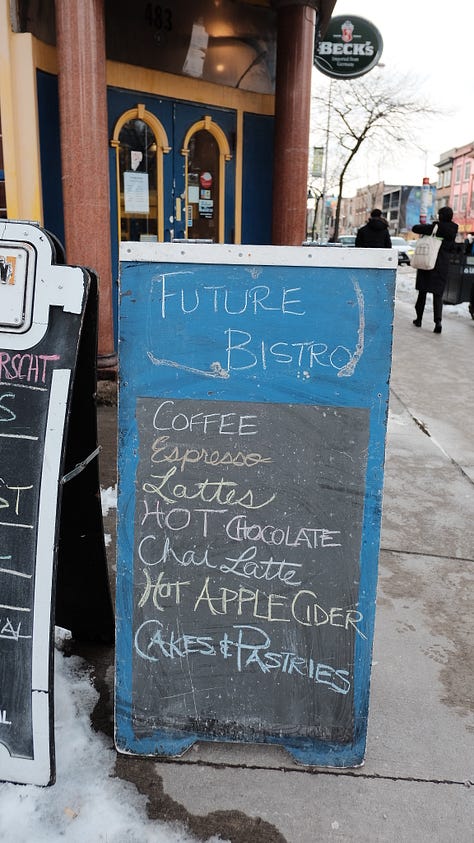
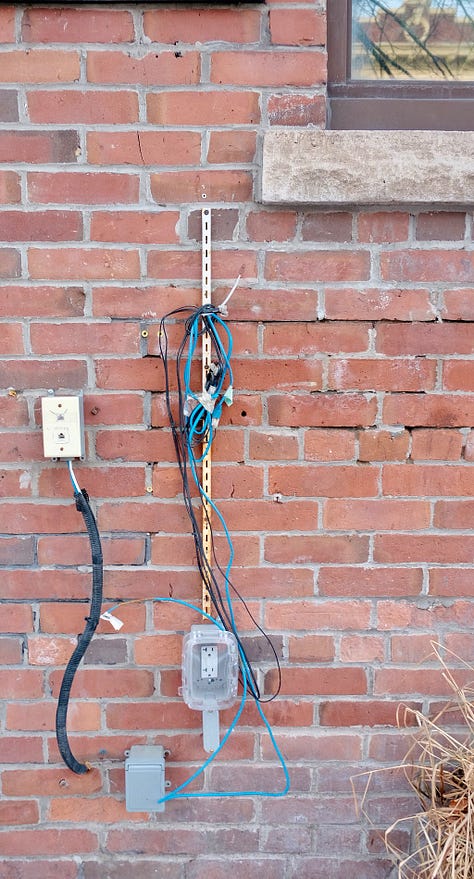
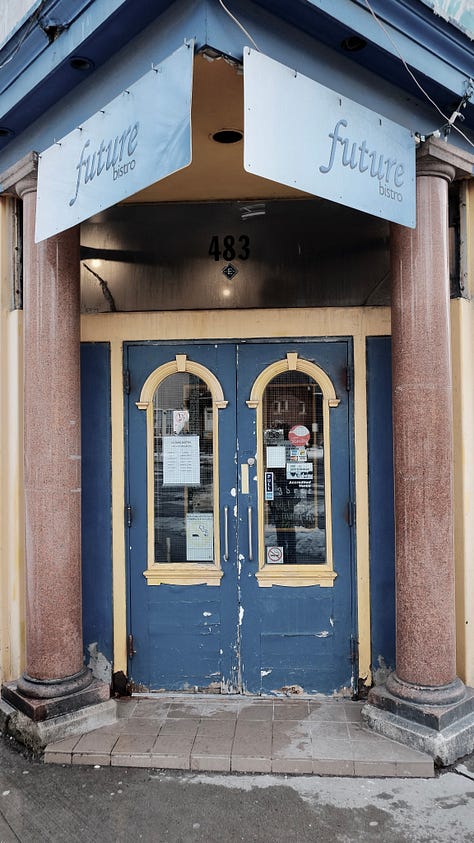
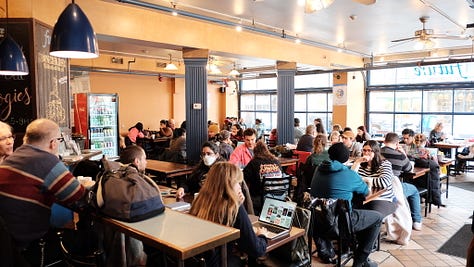
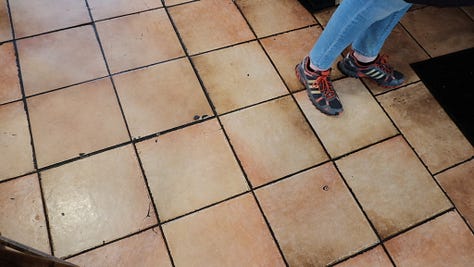
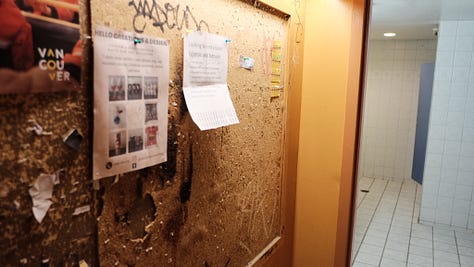
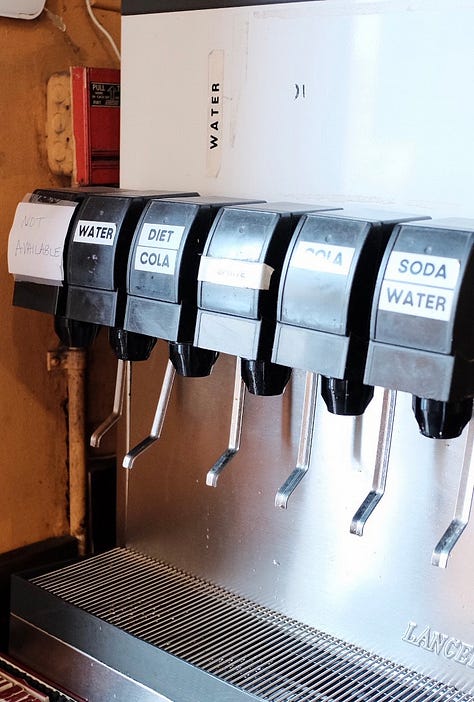
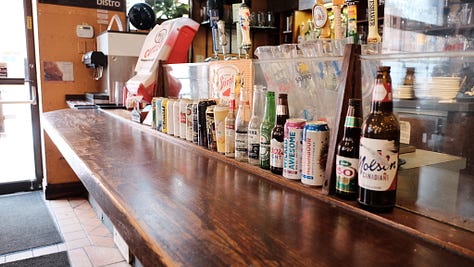
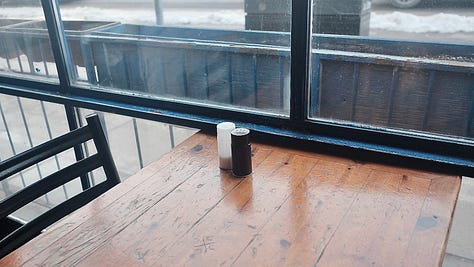
So much of my college days still exist in the grout and trim and tile of Futures. In the 16 years since, my day-to-day life has changed so much that the cafe has crystallized into a past I can no longer tap into. Before, it was where I went to discover something new. Now, I sit down and can’t stop puzzling out where I had been. I’m the same person. The cafe looks the same. But so much is different.
When I stepped into Futures this past month, for example, I was listening to soundscapes piped into my wireless earbuds from an app, called Endel. The marketing material claimed Artificial Intelligence authored everything I heard.
I’ve become reliant on ambient music while meditating and writing. It helps me drown out my surroundings and tune myself to a suitable frequency. I’ve listened to dozens of ambient works, from Brian Eno to Marconi Union, but I owe one album a special appreciation. Every One Word so far has been drafted, at least in part, while listening to Futures by the Kilometre Club.
Futures is a collection of 8 ambient tracks. Over the past year, they’ve become a sort of sonic space for me. I hit play, sit down and find that emotional well that I had once experienced at the cafe on Bloor Street.
I reached out to Daniel Field, the artist behind Kilometre Club, and asked him about the album. He was kind enough to reply.
Daniel told me that the concept for Futures “came about from reading several Canadian dystopian novels, and thinking about what they have in common.”
“I am an avid reader,” he said, “and pre-pandemic, dystopian fiction was my absolute favourite genre. And then we lived through a variation on some of the themes from the novels, and I had to step away from books like that, until I felt like I still wanted to read them again.”
I’ve read a few dystopian novels myself, but Daniel’s appreciation for the genre impressed me. Especially his reasons for enjoying them so much: “The thing is, when I read or think about dystopias, I absolutely love the idea of the light in the darkness.”
That idea rings true to me, too. The light in the darkness. Daniel’s explanation made me realize that the feeling I searched for in books and conversations, or while writing, is similar to this theme in dystopian fiction.
When I experience a moment of connection with an artist’s work, I’ve found a light in the darkness. It’s the inexplicable link between two people, one who is searching for meaning, and another who has nurtured a truth or deep feeling and made profound sacrifices to offer it to the world.
I also asked Daniel about AI. After the release of ChatGPT3 in early January, the technology is never far from my mind. I appreciate its value and power, yet the core issue I have with the chatbot is that it can’t tell truth from fiction. Like all AI, the program fumbles around in the dark word by word, pixel by pixel, not unlike an ant or a roach, mimicking coldly, and limited only by how much data it has to consume. Which makes ChatGPT a prolific creator and a terrible artist.
“AI can and already does make generative ambient music quite easily,” Daniel told me. “And given that most of the success of ambient music is found on Spotify playlists for relaxation/meditation/work, I know it's already happening that music made by humans can and will be faded for the much cheaper alternative of AI.”
Daniel makes a great point. Every year, more of the content I discover will have been created or assisted by AI. The videos I watch as I eat lunch at my desk, the articles I read on the train, and the music I listen to when I sit down to write.
Up until now, I’ve taken for granted that the art I desperately need to make sense of the world around me was made by humans. That could change.
Right now, I sense that there’s an arms race for our attention. You can choose to make your stand by not using AI or banning it or making fun of its product. But the real battlefield is our attention.
In other words, forget what AI can do. What does the product of its labour make you feel?
Daniel created Futures with intention. It affected me deeply, and offered me a space to write and think. A space I once had at other times in my life, with my dad or with Jesse or sitting in a cafe on Bloor Street.
Since the word this month is Futures, forgive me the pleasure of making a prediction. One day, sooner than we think, humans will shave away AI-generated content from the internet in the same way we dig for clues to lost civilizations below our feet. They’ll uncover pure human creativity and marvel at it the way I marvel at an axe from the Bronze Age when I visit the ROM.
I could be wrong. That’s the fun with predictions. After all, there are futures in front of me, not a single instance but many possibilities. No matter what happens, I hope I’ll continue to seek the light. Because it’s not a given; it’s a privilege. Some of us will search with our hearts and maybe even create sentences and sounds and images of our own. Others will type in a prompt and hold onto a result that urges them to see and hear and read so much. Mountains of content lacking a spark.



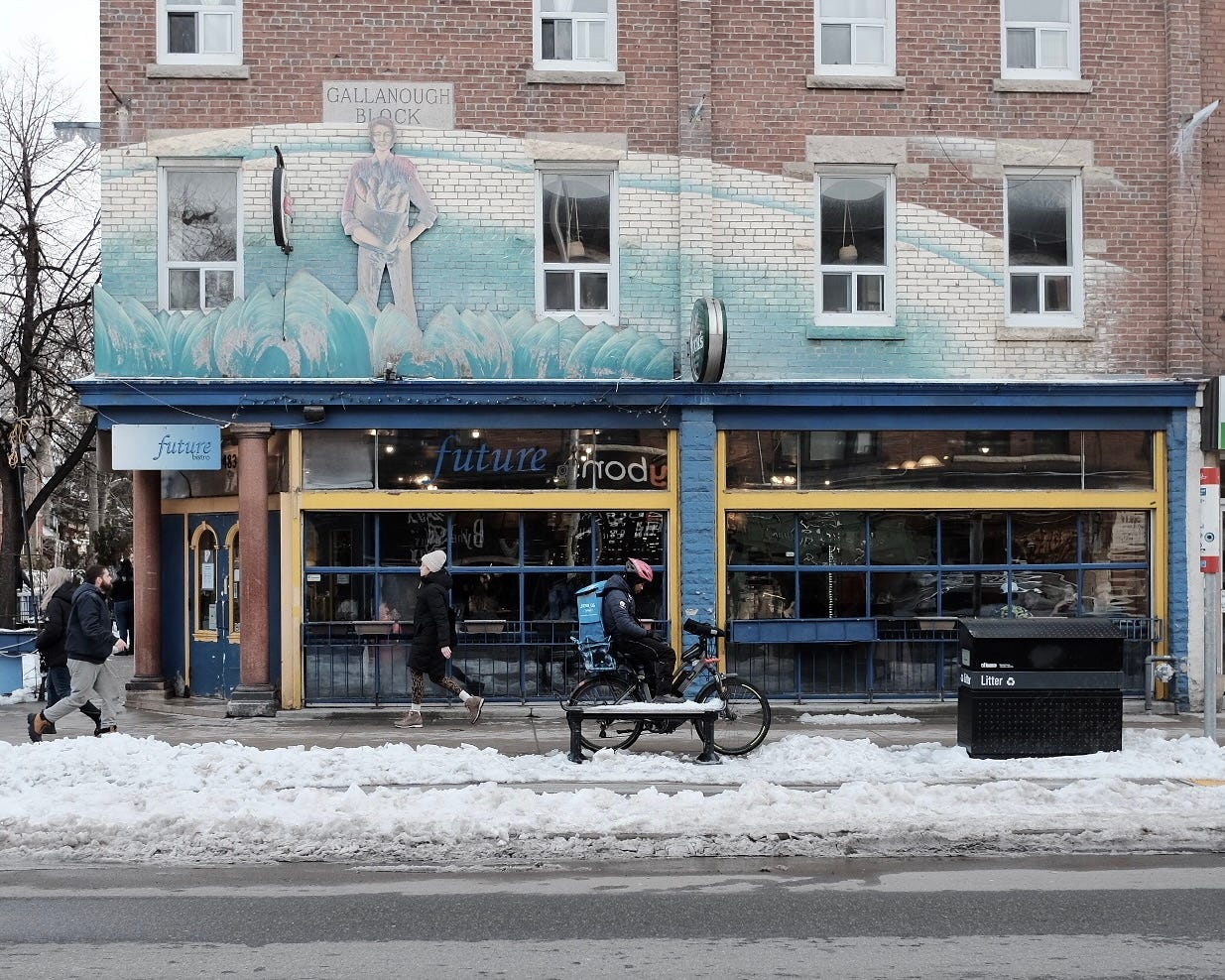
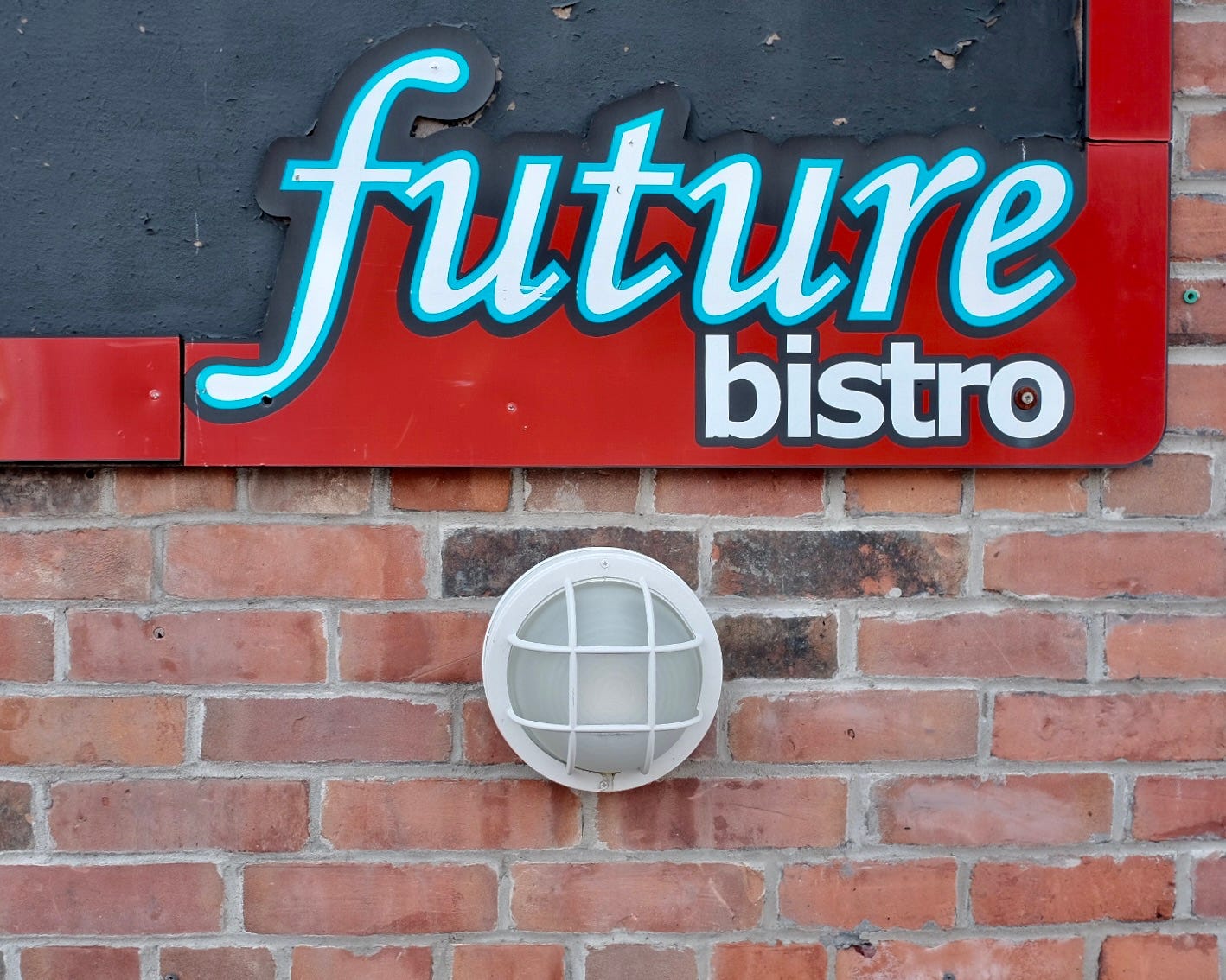
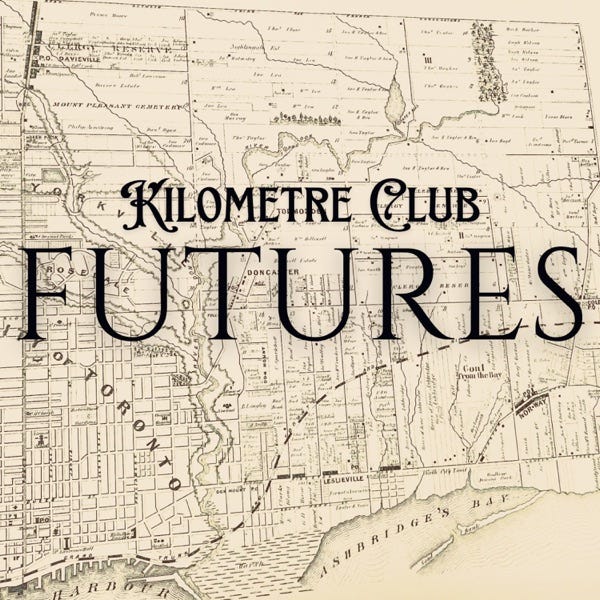
The bit about Futures (the café) reminded me of a similar place I used to go to a lot a decade ago. It's no longer there but used to do the same you did: you hear a word, a sentence and it's like a beam of light, all of a sudden a story comes together... The AI bit didn't connect with me as much as the rest did. Thank you for the inspiration.
Oh by the way I also gave “Futures” by Kilometre Club a listen and I really liked it! I also downloaded Presents: Futures Reworks into my library I thought that was really good too